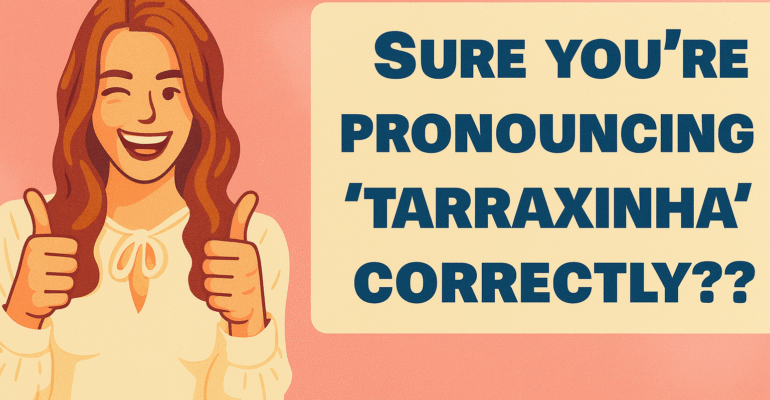Pronounce Zouk Terms Like a Native: A Quick Guide
Pronounce Zouk Terms Like a Native: A Quick Guide
Brazilian Zouk is more than just a dance—it’s a culture, a feeling, and a language of its own. Whether you’re new to Zouk or already dancing, mastering the pronunciation of key terms will help you connect with the music, the dance, and the community. This guide will teach you how to pronounce common Zouk words like a native Brazilian!
Why Pronunciation Matters in Zouk
In Brazilian Zouk, the language and the dance go hand in hand. Pronouncing terms correctly:
- Helps you communicate better with dance partners and instructors.
- Shows respect for Brazilian culture.
- Makes learning the dance more immersive.
Zouk has deep Brazilian roots, and speaking it correctly makes you feel like a true part of the community!
Understanding Brazilian Portuguese Sounds
Brazilian Portuguese has unique sounds that can be tricky for English speakers. Here are some key points to help you master them:
H vs. R
- “R” at the beginning of a word sounds like an English “H” (e.g., “Ritmo” sounds like “Heet-mo”).
- “RR” in the middle of a word is also pronounced like an “H” (e.g., “Carro” sounds like “Cah-ho”).
Nasal Sounds
Portuguese has many nasal vowels, which happen when air escapes through the nose. Words like “Lambada” and “Tarraxinha” have slight nasal sounds.
Open vs. Closed Vowels
Some vowels are open (like in “cat”) or closed (like in “cake”). Mastering these subtleties helps with pronunciation.
Common Zouk Terms and Their Pronunciation
Here’s how to say key Zouk dance terms like a native:
Zouk (Zuqui)
The word “Zouk” is actually pronounced “Zuqui” in Portuguese, with the final “k” sounding like a soft “ee” (similar to “key”). It’s not pronounced “Zook” as in English.
Lambada (Lam-BAH-dah)
Lambada, the dance that inspired Zouk, is pronounced “Lam-BAH-dah”, with the emphasis on the second syllable.
Tarraxinha (Ta-ha-SHEEN-ya)
A slower, more sensual Zouk variation. The “RR” in Portuguese sounds like an “H”, so say “Ta-ha-SHEEN-ya.”
Lento (LEN-too)
Means “slow”—important for describing Zouk tempos. The “T” sounds softer, like a mix between “T” and “CH.”
Abertura (Ah-behr-TOO-rah)
A Zouk movement meaning “opening”. The “R” is pronounced as an “H”, so it sounds like “Ah-beh-HOO-rah.”
Cambré (Cahm-BRAY)
A deep backbend in Zouk, from French ballet terminology. Pronounced as “Cahm-BRAY.”
Viradinha (Vee-rah-JEEN-ya)
A common turn in Zouk, pronounced “Vee-rah-JEEN-ya.”
Giro (JEE-roh)
Means “turn”, pronounced with a soft “J” sound: “JEE-roh.”
Soltinho (Sol-CHEEN-yo)
A looser, more open Zouk style. The “LH” sound in Portuguese is soft, like a mix of “L” and “Y.”
Condução (Con-doo-SAO)
Means “leading” in dance. The “Ç” is pronounced like “S”, so it sounds like “Con-doo-SAO.”
Zouk Music Terms You Should Know
Batida (Bah-CHEE-dah)
Means “beat” or “rhythm.”
Melodia (Meh-lo-DEE-ah)
Means “melody.”
Ritmo (HEET-mo)
Means “rhythm.” Notice how “R” sounds like “H.”
Voz (Vaws)
Means “voice.”
Sincopado (Seen-co-PAH-doo)
Means “syncopated”, referring to off-beat rhythms in Zouk music.
Pronunciation Tips for Non-Native Speakers
- Listen to Native Speakers – The best way to improve is by listening to Brazilian Portuguese.
- Practice with a Partner – Try repeating words with a Zouk partner or teacher.
- Record Yourself – Hearing yourself helps catch mistakes.
- Break Words into Syllables – Don’t rush! Pronounce each part clearly.
Listening Practice: Where to Improve Your Pronunciation
- Zouk songs by Brazilian artists
- Portuguese podcasts
- YouTube tutorials from native speakers
Common Mistakes and How to Avoid Them
- Saying “Zook” with a hard “K” – Keep it soft.
- Mispronouncing “RR” – Remember, it sounds like “H.”
- Forgetting nasal vowels – Try mimicking native speakers!
The Role of Accent in Zouk Culture
Zouk is about connection, not perfection. Learning pronunciation helps, but what truly matters is enjoying the music and dance!
Speaking with Confidence in the Zouk Community
Even if you’re not fluent, using the right pronunciation boosts confidence and helps you bond with other dancers. Don’t be afraid to practice!
Conclusion
Pronouncing Zouk terms correctly is more than just getting the sounds right—it’s about embracing the culture, deepening your connection with the dance, and feeling more confident in the community. Whether you’re leading or following, understanding and using these words properly will help you communicate better, appreciate Zouk music more deeply, and even improve your dance skills.
The beauty of Brazilian Zouk lies in its smooth movements, rich musicality, and deep cultural roots. By learning to pronounce key terms like a native, you’re not just speaking Portuguese—you’re stepping into the soul of Zouk itself.
Want to go even further?
If you’re passionate about Zouk and want to immerse yourself in the language and culture behind the dance, our special Portuguese course for Zouk dancers is perfect for you! Designed for beginners, it will help you start speaking Portuguese from day one, understand Zouk lyrics, communicate with Brazilian dancers, and truly feel at home in the Zouk world.
Learn Portuguese the Brazilian Way! 🇧🇷✨
At The Brazilian Ways, we believe language learning should be fun, immersive, and deeply connected to culture. Our unique courses help you speak Portuguese naturally while experiencing Brazil through its music, films, literature, and dance.
🎶 The Brazilian Music Club – Learn Portuguese through the rhythm and lyrics of Brazilian music.
🎬 The Movie Club – Improve your Portuguese while exploring the best of Brazilian cinema.
📖 The Short Story Club – Enhance your skills by diving into Brazilian literature.
💃 Portuguese for Zouk – Connect with the Zouk dance community while learning Portuguese.
✨ Join a vibrant community of learners and experience Brazil through language!
👉 Explore our programs and start today! 🚀
📲 Follow us on Instagram for more engaging content, language tips, and cultural insights: @thebrazilianways













